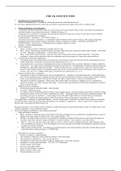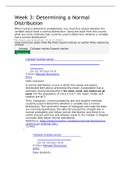Summary
Summary Constitutional Law Full Detailed Notes
- Module
- Law
- Institution
- University Of Leicester (LE)
Full notes for Constitutional and Administration Law -Introduction to Constitutional Law -Nature and Purpose of Constitutions -Written Constitutions in the World -UK Constitution -Sources of Constitution -The Separation of Powers doctrine -The Executive -Powers of the Executive -Royal ...
[Show more]






